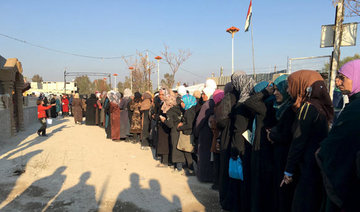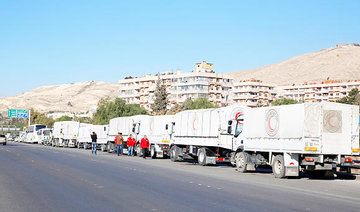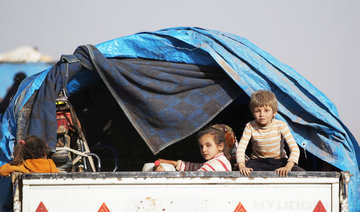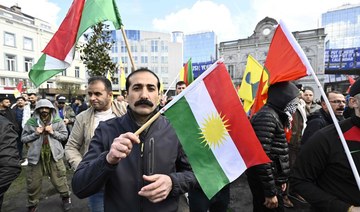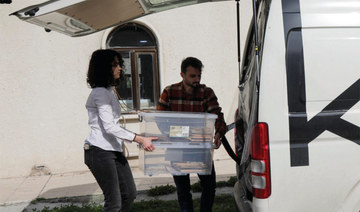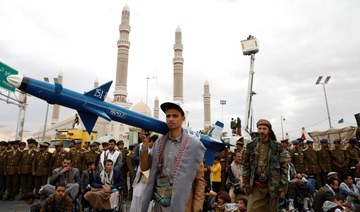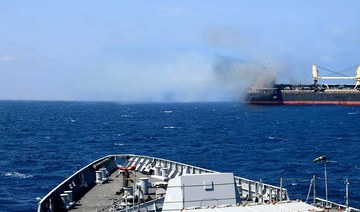DOUMA, Syria: In a humid room in the besieged Syrian town of Douma, Abu Nabil inspects the pearly white mushrooms sprouting from white sacks hanging from a ceiling.
The oyster mushrooms poking out from holes in the bags are now a substitute for meat in the fighter stronghold, where a government blockade has created food shortages.
Abu Nabil walks between the sacks inspecting the clusters of mushrooms emerging from the plastic and checking the internal temperature to ensure conditions are optimal for the unusual crop. Mushrooms are not a common crop in Syria, and rarely feature in local cuisine.
But in the Eastern Ghouta region, a key fighter bastion outside the capital Damascus, years of government siege have put traditional staples like meat far beyond the reach of ordinary people.
The Adala Foundation, a local NGO, began thinking about ways to help residents in need of nutritious alternatives.
“We turned to cultivating mushrooms because they’re a food that has high nutritional value, similar to meat, and can be grown inside houses and basements,” said Abu Nabil, an engineer who is project director.
“We were looking for a good source of proteins and mineral salts as an alternative to meat, which is very expensive,” added Adala’s director Muayad Mohieddin.
“We discovered the idea of mushrooms as a solution.”
Eastern Ghouta has been under siege since 2013, leaving locals to rely on food produced locally or smuggled in through tunnels or across checkpoints.
While the area was once an important agricultural region for Syria, mushrooms were not a local crop.
“This type of cultivation was totally unknown in Ghouta before the war,” said Mohieddin.
“We learned about it by searching on the Internet for places in similar (wartime) situations to Eastern Ghouta,” he added.
The NGO discovered mushroom farming required neither large amounts of space, nor major financial investment, making it a good fit for their needs.
To cultivate the mushrooms, the project’s workers begin by sandwiching thin slices of high-quality mushroom between pieces of carton and placing the samples in sterile plastic containers.
Over the course of 15-25 days, the mushroom slivers begin to process fungus that is then removed and mixed with sterlized barley grains to create “seeds.”
Next, straw that has been boiled until sterile and then drained is placed on a table and sprayed with gypsum to prepare it for the “seeds.”
Finally, the straw is packed into the sacks, with the mushroom starters sprinkled at intervals on top of the straw as it is layered in.
The bags are transferred to a room known as an incubator where they are suspended from the ceiling for between 25 to 45 days, and each produces between four and five mushroom harvests before being replaced.
The project relies on generators to keep conditions steady at 25 degrees Celsius and 80 percent humidity.
But with fuel also in short supply and expensive, the generators are fed with a locally produced fuel that is extracted from plastic.
In the three months since the project began, the NGO has distributed mushrooms across Douma and other parts of Eastern Ghouta free of charge.
“We distribute nearly 1,300 kilograms of mushrooms a week to 600 people,” said Abu Nabil.
“The distribution is free for the poorest families, and for those suffering malnutrition or spinal cord injuries that need lots of nutrients,” he added.
It’s a major boon for people like Um Mohammed, a mother of four, who can only dream of affording meat at prices of around $10 a kilogram.
“If you’re able to get mushrooms, it’s a huge blessing,” the 50-year-old said.
“It’s as though you’re eating a dish of fish or chicken or meat,” she added, preparing a dish in her sparsely furnished home, wearing a black robe and headscarf.
Abu Adnan Al-Sidawi, 30, had never even tasted mushrooms before he received them through the project.
“I received a bowl of mushrooms three or four weeks ago,” said Sidawi, who suffered multiple fractures in his leg and back in an airstrike in April.
“I didn’t know what they were and I’d never eaten them before. I learnt how to cook them from the Internet,” he said.
“On the first day, I fried them up with some onions, and on the second day, I cooked them in a yoghurt sauce,” he said, lying on a bed in his house.
“We liked them in the yoghurt sauce,” he said with a smile.
Like many adults in Douma, the city’s children were also unfamiliar with the ingredient.
At one psychosocial center, the children saw mushrooms for the first time when they were distributed during Ramadan, an employee said.
“I organized a small workshop to teach them about it and how it is cooked,” said the employee, who asked to be identified as Rasha.
“When I showed it to them, they said to me: ‘Miss, what is that? A flower?’”
Besieged Syria town swaps meat for mushrooms
Besieged Syria town swaps meat for mushrooms

Gaza aid could grind to a halt within days, UN agencies warn
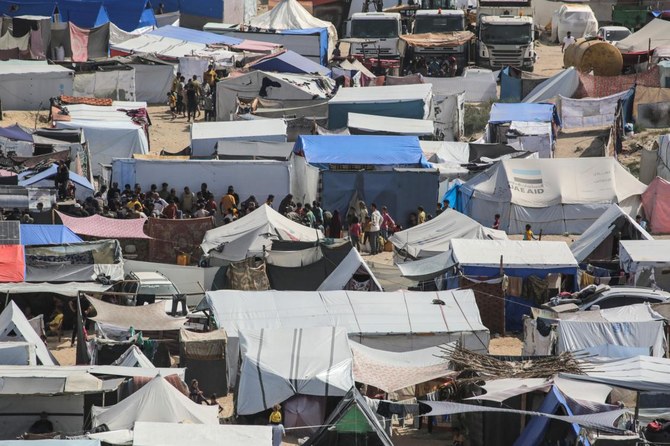
Humanitarian workers have sounded the alarm this week over the closure of the Rafah and Kerem Shalom crossings for aid and people as part of Israel’s military operation in Rafah, where around 1 million uprooted people have been sheltering.
The Israeli military said a limited operation in Rafah was meant to kill fighters and dismantle infrastructure used by Hamas, which governs the besieged Palestinian territory.
“For five days, no fuel and virtually no humanitarian aid entered the Gaza Strip, and we are scraping the bottom of the barrel,” said the UNICEF Senior Emergency Coordinator in the Gaza Strip, Hamish Young.
“This is already a huge issue for the population and for all humanitarian actors but in a matter of days, if not corrected, the lack of fuel could grind humanitarian operations to a halt,” he told a virtual briefing.
More than 100,000 people have fled Rafah in the last five days, he added.
Turkiye says it killed 17 Kurdish militants in northern Iraq, Syria
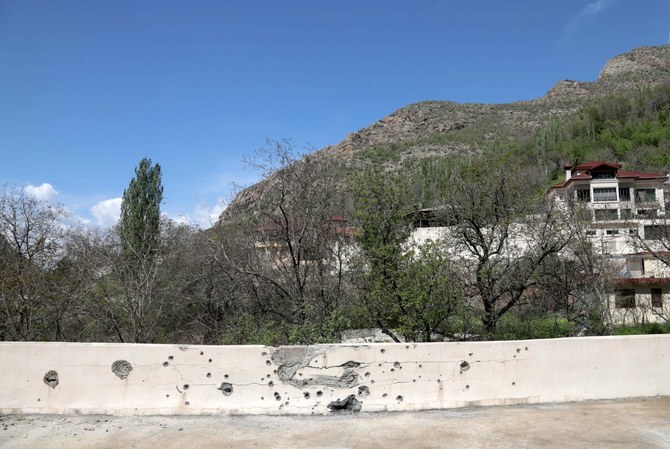
ANKARA: Turkish forces have killed 17 militants of the outlawed Kurdistan Workers Party (PKK) across various regions of northern Iraq and northern Syria, the defense ministry said on Friday.
In a post on social media platform X, the ministry said its forces had “neutralized” 10 PKK insurgents found in the Gara and Hakurk regions of northern Iraq, and in an area where the Turkish military frequently mounts cross-border raids under its “Claw-Lock Operation.”
It said another seven militants were “neutralized” in two regions of northern Syria, where Turkiye has previously carried out cross-border incursions.
The ministry’s use of the term “neutralized” commonly means killed. The PKK, which has been waging an insurgency against the Turkish state since 1984, is designated a terrorist organization by Turkiye, the United States and the European Union.
Turkiye’s cross-border attacks into northern Iraq have been a source of tension with its southeastern neighbor for years. Ankara has asked Iraq for more cooperation in combating the PKK, and Baghdad labelled the group a “banned organization” in March.
Last month, Turkish President Tayyip Erdogan held talks with officials in Baghdad and Irbil, the capital of Iraqi Kurdistan, about the continued presence of the PKK in northern Iraq, where it is based, and other issues. Erdogan later said he believed Iraq saw the need to eliminate the PKK as well.
Turkiye has also staged military incursions in Syria’s north against the YPG militia, which it regards as a wing of the PKK.
Erdogan and his ministers have repeatedly said that while Ankara is working on repairing ties with Syrian President Bashar Assad’s government after years of animosity, it will mount a new offensive into northern Syria to push the YPG away from its border.
Israeli demonstrators torch part of UN compound in Jerusalem
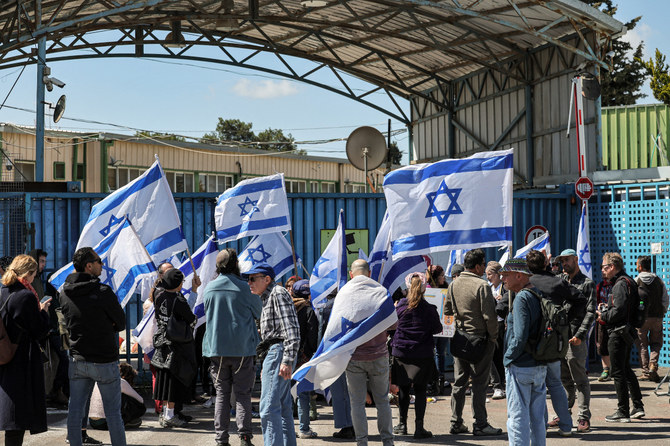
- Compound closed until proper security was restored
- Thursday’s incident was the second in less than a week
JERUSALEM: The main United Nations aid agency for Palestinians closed its headquarters in East Jerusalem after local Israeli residents set fire to areas at the edge of the sprawling compound, the agency said.
Philippe Lazzarini, the head of UNRWA, said in a post on the social media platform X that he had decided to close the compound until proper security was restored. He said Thursday’s incident was the second in less than a week.
“This is an outrageous development. Once again, the lives of UN staff were at a serious risk,” he said.
“It is the responsibility of the State of Israel as an occupying power to ensure that United Nations personnel and facilities are protected at all times,” he said.
This evening, Israeli residents set fire twice to the perimeter of the UNRWA Headquarters in occupied East Jerusalem.
— Philippe Lazzarini (@UNLazzarini) May 9, 2024
This took place while UNRWA and other UN Agencies’ staff were on the compound.
While there were no casualties among our staff, the fire caused extensive damage… pic.twitter.com/ZqHFDNkiWC
UNRWA, set up to deal with the Palestinian refugees who fled or were forced from their homes during the 1948 war around the time of Israel’s creation, has long been a target of Israeli hostility.
Since the start of the war with Gaza Israeli officials have called repeatedly for the agency to be shut down, accusing it of complicity with the Islamist movement Hamas in Gaza, a charge the United Nations strongly rejects.
Israel considers all of Jerusalem its indivisible capital, including eastern parts it captured in a 1967 war, which Palestinians seek as the future capital of an independent state.
Lazzarini said staff were present at the time of the incident but there were no casualties. However outdoor areas were damaged by the blaze, which was put out by staff after emergency services took time to respond.
There was no immediate comment from the Israeli police.
Lazzarini said groups of Israelis had been staging regular demonstrations outside the UNRWA compound for the past two months and said stones were thrown at staff and buildings in the compound this week.
In footage shared with Lazzarini’s post, smoke can be seen rising near buildings at the edge of the compound while the sound of chanting and singing can be heard.
A crowd accompanied by armed men were witnessed outside the compound chanting “Burn down the United Nations,” Lazzarini said.
UKMTO reports hijacking attempt of vessel east of Yemen’s Aden
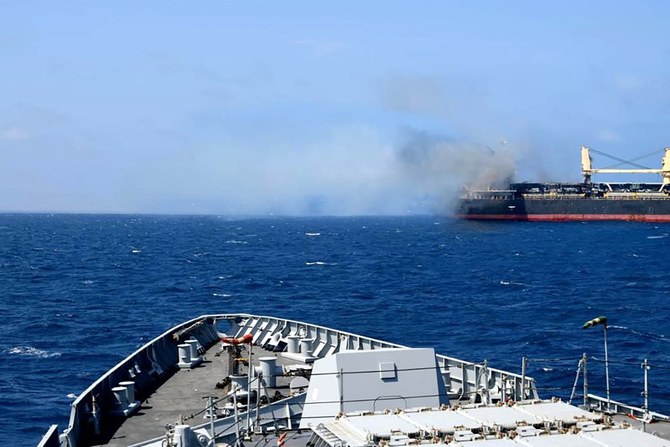
DUBAI: The United Kingdom Maritime Trade Operations (UKMTO) organization said on Friday it had received a report of a failed hijacking attempt of a vessel 195 nautical miles east of Yemen’s Aden.
The vessel’s master reported being approached by a small craft carrying five or six armed people with ladders.
Houthi militants in Yemen have launched drone and missile attacks on shipping in and around the Red Sea and the Indian Ocean to show support for the Palestinians in the Gaza war.
Maritime sources say pirates may be encouraged by a relaxation of security or may be taking advantage of the chaos caused by attacks on shipping by the Iran-aligned Houthis.
After firing on the vessel, the people in the small craft were forced to abort their approach when the security team on the vessel returned fire, the UKMTO reported.
The vessel and its crew are reported to be safe, and the vessel is proceeding to its next port of call, it said.
Hamas says ‘ball is completely’ in Israel’s hands in Gaza truce talks
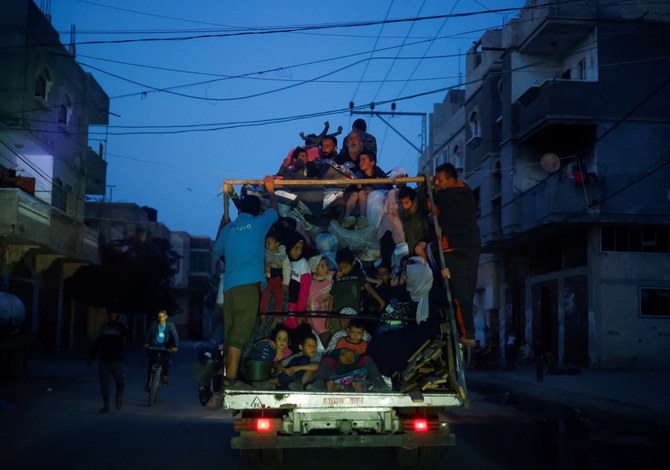
GAZA STRIP: Palestinian militant group Hamas said early Friday that its delegation attending Gaza ceasefire negotiations in Cairo had left the city for Qatar, adding the “ball is now completely” in Israel’s hands.
“The negotiating delegation left Cairo heading to Doha. In practice, the occupation (Israel) rejected the proposal submitted by the mediators and raised objections to it on several central issues,” the group said in a message to other Palestinian factions, adding it stood by the proposal.
“Accordingly, the ball is now completely in the hands of the occupation.”
State-linked Egyptian outlet Al-Qahera News reported Thursday that representatives of both camps left Cairo after two days of negotiations aimed at finalizing a ceasefire deal in the seven-month war in the Gaza Strip.
Efforts by Egypt and other mediators, namely Qatar and the United States, “continue to bring the points of view of the two parties closer together,” the outlet added, citing a high-level Egyptian source.
Hamas said Monday that it had accepted a ceasefire proposal put forward by mediators.
The deal, the group said, involved a withdrawal of Israeli forces from Gaza, the return of Palestinians displaced by the war, and the exchange of hostages held by militants for Palestinian prisoners detained in Israel, with the aim of a “permanent ceasefire.”
Netanyahu’s office at the time called the proposal “far from Israel’s essential demands,” but said the government would still send negotiators to Cairo.
Israel has long been resistant to the idea of a permanent ceasefire, insisting it must finish the job of dismantling Hamas.


